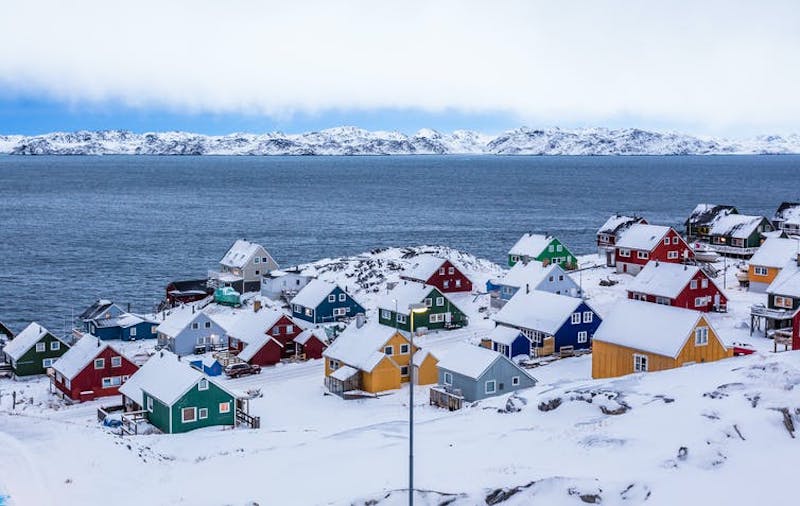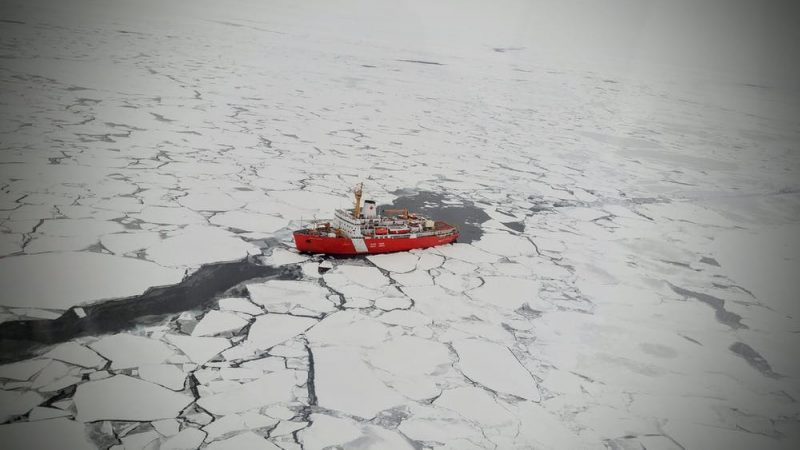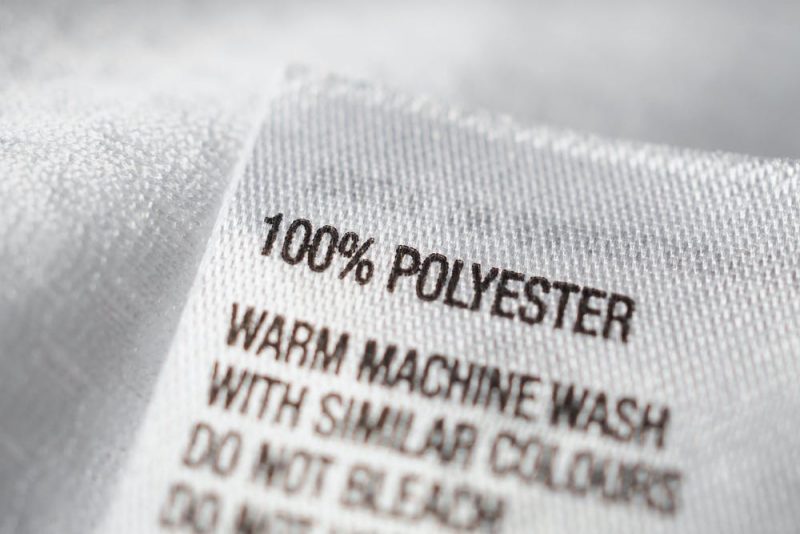

Scientists have found widespread evidence of microplastics in the Arctic Ocean. This could further stress the fragile Arctic ecosystem and the food it provides to people living there. Image via Shutterstock/ The Conversation.
By Peter S. Ross, University of British Columbia
The Arctic has long proven to be a barometer of the health of our planet. This remote part of the world faces unprecedented environmental assaults, as climate change and industrial chemicals threaten a way of life for Inuit and other Indigenous and northern communities that rely heavily on seafood and marine mammals for food.
But who would have imagined that the clothes we wear might add to this onslaught? Evidence increasingly shows that tiny synthetic fibers are permeating the Arctic Ocean and finding their way into zooplankton, fish, seabirds and marine mammals.
In a new study published in Nature Communications, my colleagues and I find a stark confirmation that microplastics are found throughout the Arctic Ocean from Europe to the North Pole and the North American Arctic. Their presence raises concerns that textiles, laundry and municipal wastewater may be an important source of these emerging pollutants.
Extensive Arctic sampling and in-depth analysis
Our research was led by a a team at Ocean Wise Conservation Association in Vancouver, and supported by field teams from Fisheries and Oceans Canada. We collected seawater samples from just below the surface of the Arctic Ocean as part of four scientific expeditions stretching from Tromsø, Norway, to the Beaufort Sea in North America.

The Canadian Coast Guard Ship Louis S. St. Laurent transiting the Arctic Ocean. This expedition between Norway and Canada collected seawater samples for microplastics analysis. Image via Arthi Ramachandra/Fisheries and Oceans Canada.
A total of 71 near-surface samples were collected across the Arctic. We also collected 26 samples from the Beaufort Sea from just below the surface down to a depth of 1,015 meters (3,330 feet). We then filtered and analyzed the samples back at the Ocean Wise Plastics Lab using microscopes and spectroscopy to identify plastic polymers.
Microplastics are particles less than five millimeters (0.2 inches) long. We found an average of 49 microplastic particles per cubic meter of seawater throughout the Arctic, illustrating just how widespread synthetic plastic pollution has become in this remote region. This is lower than concentrations found in more urbanized regions in the South, but approaching levels found in the open Pacific and Atlantic Oceans.
Of these, 92% were fibers, averaging 14 microns (0.014 mm) thick and 1,100 microns (1.1 mm) long. We documented every color imaginable: red, blue, yellow, green … But perhaps the most striking finding in the lab was that 73% of these fibers were polyester.
Tracking the source of mystery fibers
Our research expedition covered more than 12,000 miles (20,000 km) and provided clues as to the origins of these fibers. Their widespread distribution points to sources outside the Arctic, rather than local ones.
We found that fibers in the eastern Arctic were three times more abundant in the eastern Arctic than the west. They were also 50% longer in the east, and their infrared signature more closely resembled commercial polyester.
All this evidence suggests most of these fibers entered the Arctic Ocean from the Atlantic Ocean. Oceanographic features provide a supporting explanation for these observations, with approximately nine times more water entering the Arctic Ocean from the Atlantic than the Pacific.
The size, shape, colors and polymer identity of the majority of these particles provide additional indications of their origins. These physical characteristics closely resembled what we encountered in our 2018 study of microplastics in the largest domestic wastewater treatment plant in Vancouver.

A study of microfibers in the Arctic Ocean found most of them were polyester, likely shed from clothing during washing. Image via Shutterstock/ The Conversation.
The size and shape of these fibers also closely mirrored those observed in laundry effluent, and builds on a series of studies showcasing the vulnerability of textiles to shedding during home laundry. In fact, we recently estimated that the average Canadian or U.S. household releases over 500 million fibers per year from laundry. This adds up to 3.5 quadrillion fibers weighing 878 tonnes from these two countries alone.
Not all textiles shed equally
The weight of evidence points to something most of us could not even imagine: that washing our clothes is contributing to the widespread contamination of the world’s oceans with microfibers, both synthetic and natural. There is a glimmer of hope, though, as we see many textile design, manufacture and retail firms steeping onto the sustainability path.
In launching our Microfiber Partnership – now supported by organizations in Canada, the United States and Europe, including MEC, Patagonia, REI, Arc’teryx, the Outdoor Industry Association, Joe Fresh, Aritzia, Cotton Inc., McLean Foundation, Laudes Foundation, MetroVancouver and Environment and Climate Change Canada – we have discovered that not all textiles shed equally. In fact, an 800-fold difference between low and high fiber shedding material points to a significant opportunity for more sustainable clothing design.

Polyester, nylon, acrylic and other synthetic materials make up more than half the materials that go into clothing globally. With each round of washing, tiny fibers less than 5 millimeters (0.2 incles) long are shed and released into wastewater, where they can end up in the ocean. Image via Shutterstock/ The Conversation.
And there is much more opportunity for positive momentum, with governments working around the world on a legislative agenda for plastics. Canada launched the Ocean Plastics Charter at the G7 in 2018.
Consumers and homeowners are stepping up, too, as the world increasingly embraces a closed-loop economy for plastics, where items are reused or recycled instead of thrown away. In the case of laundry, one can install a lint trap that reduces fiber release from washing machines by up to 95%.
There is much bad news about the environment these days, but our report about microplastics in the Arctic can help us chart a clear set of solution-oriented opportunities for the public, for governments and for the private sector.
Peter S. Ross, adjunct professor, Earth, Ocean and Atmospheric Sciences, University of British Columbia
This article is republished from The Conversation under a Creative Commons license. Read the original article.
Bottom line: A new study has found that pollution from microplastics is widespread in the Arctic Ocean, and 92% of those particles are minuscule synthetic fibers from our clothes.
![]()
from EarthSky https://ift.tt/3qkLt2s


Scientists have found widespread evidence of microplastics in the Arctic Ocean. This could further stress the fragile Arctic ecosystem and the food it provides to people living there. Image via Shutterstock/ The Conversation.
By Peter S. Ross, University of British Columbia
The Arctic has long proven to be a barometer of the health of our planet. This remote part of the world faces unprecedented environmental assaults, as climate change and industrial chemicals threaten a way of life for Inuit and other Indigenous and northern communities that rely heavily on seafood and marine mammals for food.
But who would have imagined that the clothes we wear might add to this onslaught? Evidence increasingly shows that tiny synthetic fibers are permeating the Arctic Ocean and finding their way into zooplankton, fish, seabirds and marine mammals.
In a new study published in Nature Communications, my colleagues and I find a stark confirmation that microplastics are found throughout the Arctic Ocean from Europe to the North Pole and the North American Arctic. Their presence raises concerns that textiles, laundry and municipal wastewater may be an important source of these emerging pollutants.
Extensive Arctic sampling and in-depth analysis
Our research was led by a a team at Ocean Wise Conservation Association in Vancouver, and supported by field teams from Fisheries and Oceans Canada. We collected seawater samples from just below the surface of the Arctic Ocean as part of four scientific expeditions stretching from Tromsø, Norway, to the Beaufort Sea in North America.

The Canadian Coast Guard Ship Louis S. St. Laurent transiting the Arctic Ocean. This expedition between Norway and Canada collected seawater samples for microplastics analysis. Image via Arthi Ramachandra/Fisheries and Oceans Canada.
A total of 71 near-surface samples were collected across the Arctic. We also collected 26 samples from the Beaufort Sea from just below the surface down to a depth of 1,015 meters (3,330 feet). We then filtered and analyzed the samples back at the Ocean Wise Plastics Lab using microscopes and spectroscopy to identify plastic polymers.
Microplastics are particles less than five millimeters (0.2 inches) long. We found an average of 49 microplastic particles per cubic meter of seawater throughout the Arctic, illustrating just how widespread synthetic plastic pollution has become in this remote region. This is lower than concentrations found in more urbanized regions in the South, but approaching levels found in the open Pacific and Atlantic Oceans.
Of these, 92% were fibers, averaging 14 microns (0.014 mm) thick and 1,100 microns (1.1 mm) long. We documented every color imaginable: red, blue, yellow, green … But perhaps the most striking finding in the lab was that 73% of these fibers were polyester.
Tracking the source of mystery fibers
Our research expedition covered more than 12,000 miles (20,000 km) and provided clues as to the origins of these fibers. Their widespread distribution points to sources outside the Arctic, rather than local ones.
We found that fibers in the eastern Arctic were three times more abundant in the eastern Arctic than the west. They were also 50% longer in the east, and their infrared signature more closely resembled commercial polyester.
All this evidence suggests most of these fibers entered the Arctic Ocean from the Atlantic Ocean. Oceanographic features provide a supporting explanation for these observations, with approximately nine times more water entering the Arctic Ocean from the Atlantic than the Pacific.
The size, shape, colors and polymer identity of the majority of these particles provide additional indications of their origins. These physical characteristics closely resembled what we encountered in our 2018 study of microplastics in the largest domestic wastewater treatment plant in Vancouver.

A study of microfibers in the Arctic Ocean found most of them were polyester, likely shed from clothing during washing. Image via Shutterstock/ The Conversation.
The size and shape of these fibers also closely mirrored those observed in laundry effluent, and builds on a series of studies showcasing the vulnerability of textiles to shedding during home laundry. In fact, we recently estimated that the average Canadian or U.S. household releases over 500 million fibers per year from laundry. This adds up to 3.5 quadrillion fibers weighing 878 tonnes from these two countries alone.
Not all textiles shed equally
The weight of evidence points to something most of us could not even imagine: that washing our clothes is contributing to the widespread contamination of the world’s oceans with microfibers, both synthetic and natural. There is a glimmer of hope, though, as we see many textile design, manufacture and retail firms steeping onto the sustainability path.
In launching our Microfiber Partnership – now supported by organizations in Canada, the United States and Europe, including MEC, Patagonia, REI, Arc’teryx, the Outdoor Industry Association, Joe Fresh, Aritzia, Cotton Inc., McLean Foundation, Laudes Foundation, MetroVancouver and Environment and Climate Change Canada – we have discovered that not all textiles shed equally. In fact, an 800-fold difference between low and high fiber shedding material points to a significant opportunity for more sustainable clothing design.

Polyester, nylon, acrylic and other synthetic materials make up more than half the materials that go into clothing globally. With each round of washing, tiny fibers less than 5 millimeters (0.2 incles) long are shed and released into wastewater, where they can end up in the ocean. Image via Shutterstock/ The Conversation.
And there is much more opportunity for positive momentum, with governments working around the world on a legislative agenda for plastics. Canada launched the Ocean Plastics Charter at the G7 in 2018.
Consumers and homeowners are stepping up, too, as the world increasingly embraces a closed-loop economy for plastics, where items are reused or recycled instead of thrown away. In the case of laundry, one can install a lint trap that reduces fiber release from washing machines by up to 95%.
There is much bad news about the environment these days, but our report about microplastics in the Arctic can help us chart a clear set of solution-oriented opportunities for the public, for governments and for the private sector.
Peter S. Ross, adjunct professor, Earth, Ocean and Atmospheric Sciences, University of British Columbia
This article is republished from The Conversation under a Creative Commons license. Read the original article.
Bottom line: A new study has found that pollution from microplastics is widespread in the Arctic Ocean, and 92% of those particles are minuscule synthetic fibers from our clothes.
![]()
from EarthSky https://ift.tt/3qkLt2s

Aucun commentaire:
Enregistrer un commentaire